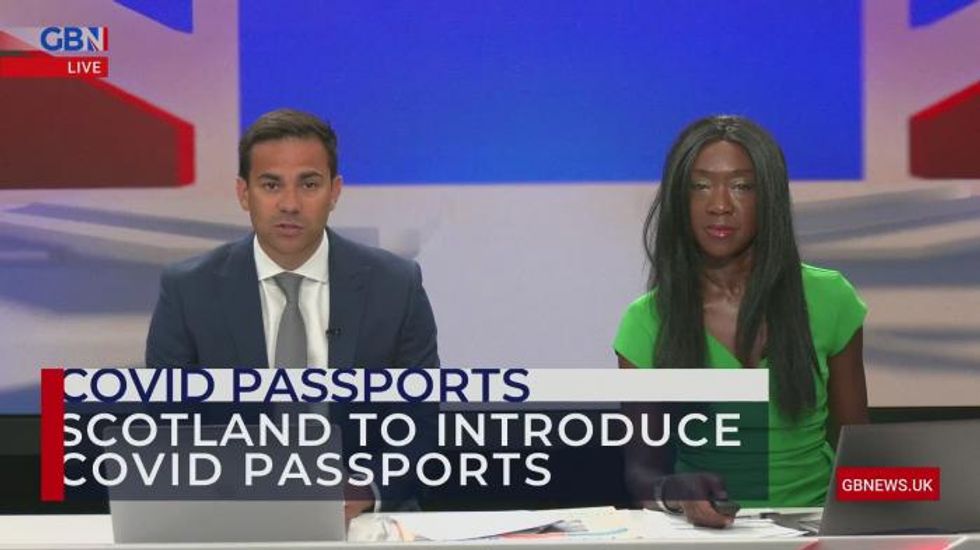Don't Miss
Most Read
Trending on GB News
The Scottish Government’s plans for vaccine passports have been backed by MSPs as the Greens provided the necessary votes.
In the first major vote since the co-operation agreement between the SNP and the Greens was finalised, the party joined the government in backing vaccine passports by 68 votes to 55.
Thursday’s vote was not to pass legislation, but rather to pass a motion supporting the implementation of vaccine passports.
A paper released just hours before MSPs are due to vote on the scheme stated there would be a legal requirement for businesses to “take all reasonable measures” to ensure compliance, while ministers are also considering if there is a need for an offence to stop the “misuse” of the certificates.
From October 1, the scheme will make a QR code available through a smart phone app – along with a paper alternative for those who need it – which will be scanned before entry is allowed to nightclubs or similar venues, adult entertainment, unseated indoor events with more than 500 people, outdoor unseated events with more than 4,000 people or any event with more than 10,000 in attendance.
It is hoped that mandating the use of vaccine passports will encourage more reluctant Scots to get vaccinated so they are able to attend.
Regulations will be introduced by the Scottish Government and reviewed every three weeks, with the rules to be revoked when they are deemed no longer necessary.
People under 18, those who are medically exempt, participating in vaccine trials or who are employees within venues will not have to show certification to gain entry.
Despite the scheme being voted on by MSPs on Thursday, it was not yet finalised, with the detail on a number of issues – including the definition of a nightclub – still to be confirmed.
Scottish Tory leader Douglas Ross, in the debate on the issue in Holyrood, took aim at the level of detail in the document.
“I’m really not sure what we’re expected to do as parliamentarians, as people sent here to scrutinise the government,” he said.
“Nicola Sturgeon announced these plans a week ago – we were told we would get a paper setting out how these vaccine passports would work.”
He added: “Surely, a responsible government should bring forward proposals that are ready to be enacted, further consultation is not suitable if you want the support of members in this chamber.”
The paper published on Thursday said: “We are working with a range of stakeholders to finalise the design of the scheme.
“These stakeholders include local government, NHS boards and businesses/representative organisations in sectors that will be required to implement a certification scheme.”
Covid Recovery Secretary John Swinney, also speaking in the debate on Thursday, said: “As I’ve indicated, the government has set out details to parliament of the nature of the scheme, we’ve put those proposals to parliament this afternoon as part of an approach to protect a very fragile situation that we face in Scotland today of rising infections and hospitalisation that poses a threat to our national health service.
“We are trying to take proportionate action to protect the public from coronavirus.”
Scottish Green co-leader Patrick Harvie, who became a Scottish Government minister in August, set out his position as he made an intervention in the debate.
Previously, Mr Harvie had expressed concerns about the use of Covid status certificates.
He said: “There is a very big difference between thinking that this policy should be approved when cases were running at a few hundred a day, to thinking it is worth considering when cases are running at around 7,000 a day.
“And once the entire adult population has had the opportunity for both vaccines.”
Scottish Labour’s health spokeswoman Jackie Baillie said her party supported a certification system based on a negative coronavirus test rather than vaccine status.
She said: “Almost 60,000 people were consulted by the UK Government, how many have the Scottish Government consulted?
“Have they even spoken to the businesses that will be responsible for implementing this?
“There seems to have been little meaningful engagement, according to the night-time industry and the hospitality industry.”
Earlier, businesses had said they were still in the dark about how the Scottish Government’s Covid passports would work.
Speaking on the BBC’s Good Morning Scotland programme, the executive director of UK Hospitality Scotland, Leon Thompson, said there was a lack of clarity about what the Covid passport plans would entail.
He said: “We’re very concerned about the proposals and the vote that’s going ahead today.
“We weren’t so consulted about this ahead of the First Minister’s statement last week, we had some very rushed and hurried conversations with officials over the last few days.
“We still have no real information on how the Scottish Government plans to introduce the passport scheme and what will actually be required of venues, nightclubs, major events and so on.
“The other challenge that we have is defining nightclubs.
“The First Minister is very keen to see a very tight introduction of the vaccine certifications but already in the discussions we’re beginning to see this spilling over into larger bars, potentially, and other hospitality settings with perhaps live music and potentially dancing.”










